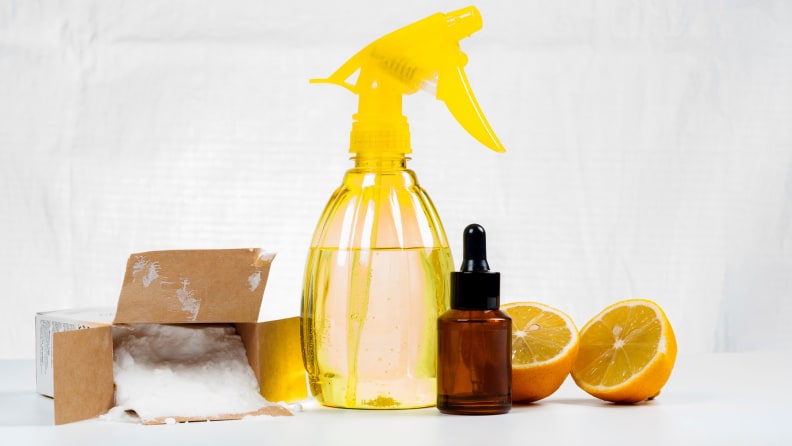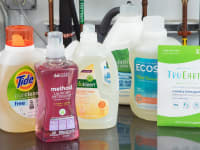9 benefits of switching to natural cleaning products
Going green has never been easier, cheaper, or better for your health.
 Credit:
Credit:
Products are chosen independently by our editors. Purchases made through our links may earn us a commission.
Natural and green cleaning products have been mainstream for a while now. While early offerings might have been overpriced with underwhelming cleaning capabilities, times have changed. Not only is more information available about how harmful some cleaning products can be, but greener cleaning products are being recommended by the EPA.
Natural cleaning products can be safer than traditional cleaners and isn’t that hard to switch. If you’re still on the fence, we’ve compiled a list of reasons why opting for a natural cleaner might make sense for you.
1. Less harmful if swallowed
According to the 2017 data from the American Association of Poison Control Centers household cleaners accounted for 190,319 cases of poison exposure and 45.2% of all poison exposure cases were from children age five or younger. Almost universally, traditional cleaning agents are harmful if swallowed.
While it’s best to have a secure area of your home to keep dangerous materials away from your kids and pets, childproofing solutions aren’t perfect and we all make mistakes. Using natural alternatives limits the potential harm that could occur and, if nothing else, might offer more peace of mind.
If you are looking for a cleaner that’s safe for pets and babies alike, the Puracy Natural All Purpose Cleaner Concentrate is a good pick: It has thousands of five-star ratings on Amazon and the Environmental Working Group gives it an A rating.
2. Safer for everyday use
While some cleaning products are obviously harmful, many have effects that are only evident over time. Many laundry and dishwashing detergents, as well as most products with fragrances, contain endocrine disruptors, chemicals that interfere with the body’s hormone functions.
These chemicals are ostensibly safe: There’s a very, very low risk that any given exposure will result in negative health outcomes. With constant, repeated exposure, however, the risk of harm goes up. Unfortunately, cleaning routines provide the opportunity for constant, repeated exposure to these chemicals.
Natural cleaning products—in general—don’t have this risk. Cleaners with vinegar, baking soda, or essential oils base don’t become harmful the more you use them. Remember that natural cleaners often include vinegar, which can erode natural stone surfaces like marble and granite. If you do have marble countertops, stick to warm water and baking soda.
The one caveat here is borax. Borax is often praised as a green cleaner, but it’s also been associated with endocrine disruption. For complicated reasons, it’s hard to nail down exactly what the health risks might be. If your goal for switching to greener, more natural cleaning products is to avoid exposure to potential harm, we wouldn’t recommend using borax-based products or recipes.
If you’d prefer a safe all-purpose cleaner, ideal for daily use, Simple Green makes a great option. Simple Green is a great example of a company embracing transparency to aid consumers in making their purchasing decisions: They provide safety sheets for all their products, which list all their ingredients, concentrations, and toxicological information, as well as other helpful data.
3. Fewer unexpected outcomes
Savvy housekeepers know to not mix chemicals like chlorine, bleach, ammonia, or lye for fear of potentially powerful, noxious chemical reactions. But did you know that some common sudsing agents—though perfectly safe on their own—can create carcinogenic compounds when they come into contact with common food preservatives?
The problem is there’s a lot of potential chemical interactions that could create result in a harmful outcome. While consumers comfortable with chemistry could research all the outcomes of using a particular product, few companies disclose their ingredients to the public. The EPA does test cleaning products for risk, but they’re not policing all possible chemical interactions.
One of the best benefits of natural cleaning products is you know what’s in them and you know what the possible outcomes might be of using them. In fact, in some cases, you can skip the commercial products entirely and just use baking soda diluted with a little bit of water. You might have to scrub a little harder, but it’ll be safe to use, regardless of the circumstances, without having to consult the periodic table.
4. Better indoor air quality
Have you noticed that some cleaning products (especially glass cleaners) dry up very quickly? Chances are that’s because they’re using volatile organic compounds, ammonia, or acetone. These substances evaporate at room temperature, which can quickly lead to poor indoor air quality. The EPA specifically calls out volatile organic compounds (VOCs) for affecting indoor air quality, and contributing to eye/nose/throat irritation, headaches, nausea, or even damage to organs or the central nervous system damage. These compounds are also suspected to be carcinogenic.
Ideally you could cut down on the risk from these products by keeping the area well-ventilated, but if there’s no window and you don’t have an air purifier handy, it might not be an option. (If you’d like to explore that option, check out our list of the best air purifiers.) Additionally, many objects in your home already off-gas VOCs, so it’s helpful to reduce the number of sources as much as you can.
Most natural cleaners are able to leverage baking soda and various oils to lend a subtle, safe scent, without all these health risks. If you’re looking for a VOC-free heavy duty cleaner that still managed to get an A grade from the Environmental Watch Group, try CLR Calcium, Lime, Rust Cleaner.
5. Better for those with sensitivities
Even if you’re wearing gloves and working in a well-ventilated area, many cleaning products can still be dangerous for those with allergies, asthma, or other sensitivities. Ammonia, acetone, volatile organic compounds, and other sources of gaseous irritants are especially risky: It’s hard to completely avoid inhaling a gas when the sponge or rag it’s coming from is in your hand.
The best natural cleaning products rely on vinegar, oils, and plant-based surfactants and readily disclose their ingredients. These materials are not especially dangerous for humans, and the transparency makes it easy for those with specific allergies to know if they should avoid it.
If you want to avoid an unwanted reaction, Attitude’s Sensitive Skin Window & Mirror Cleaner seems to be a good pick. It’s one of the few products that EWG’s Guide to Healthy Cleaning rates “low concern” across the board.
6. Fewer toxins entering the environment
If you’re washing detergent down the drain, there’s a chance some of its ingredients won't be caught by wastewater treatment and make their way into the water system. These chemicals can contribute to animal die-offs and other ecological problems. If you’re cleaning with something that requires a well-ventilated area, those noxious gasses are entering the air outside, which is one of the ways smog forms. Many cleaning products biodegrade very slowly, which means they might be negatively impacting the environment long after they’ve gone out with the garbage.
While you and your family certainly aren’t polluting on a significant scale, there are smart, easy choices you could make to help make your own household more environmentally friendly. Natural cleaning options (and again, we’re not including borax here) have minimal environmental impacts. In fact, making your own cleaners can help significantly reduce your household plastic waste by reducing the number of plastic bottles you consume.
If you need a naturally abrasive cleaner that you can feel completely confident isn’t messing with the environment, Bon Ami is an older product that’s still good. The original formula is powdered feldspar, an aluminum silicate that also makes up about 60% of exposed rocks on earth. So, using Bon Ami might pollute the environment about as much as skipping a rock across a pond.
7. Won’t contribute to drug-resistant bacteria
Many cleaners advertise their antibacterial properties, but those claims can be reasons to avoid those products. According to the FDA, there’s no evidence showing that antibacterial soaps are better at preventing illnesses than washing with plain soap and water.
Also, the most commonly used antibacterial agents might not be safe for long-term use. The CDC corroborates these claims: Evidence suggests unnecessary use of antibacterial agents can contribute to bacteria developing resistances, making existing medical treatments less effective. It also may be correlated with increased rates of allergies and other sensitivities, like asthma or eczema. Getting infections in early childhood is one way our bodies develop immunities and might lead to fewer allergies and sensitivities later in life.
If you want to help keep drug-resistant bacteria to a minimum and keep your immune system healthy, stay away from labels that say “antibacterial” when you're looking for a daily cleaner.
8. Less clutter
How many plastic bottles of cleaner do you have around your home? Do you have separate cleaners for every unique surface in your home? The truth is, you don’t really need different formulations to clean your tiles, tub, and toilet. By switching to a green multi-surface cleaner, you’ll not only save a lot of cabinet space, but you’ll also cut down the number of times you’ll search for that one bottle in dozen that claims to clean ceramic better than the others.
9. Less expensive—especially if you DIY

While many DIY cleaners lack the oomph of a professionally made product, they're a good option for cleaning up moderate messes.
In the past, green cleaners could be a bit pricey: It was a choice to spend a little extra for a safer, more ethical product. Times have changed, however, and as technology has advanced and more companies have entered the green cleaning scene, prices for some products have dropped to be more in line with other cleaners.
Going green is especially cost-effective if you make your own cleaners from scratch. Now, in the past we’ve tested some popular DIY detergent recipes and found they weren’t as effective as store brands at getting out tough stains. But not all of your laundry loads are heavily soiled. When you're cleaning clothes that just need a fast wash, you can try out a DIY detergent.
A great way to get into making your own natural cleaner is with the Cleaning Essentials spray bottle, a durable glass bottle with several DIY recipes printed right on the side. Users also report great customer service from this company.
The verdict
Switching over to greener products definitely has some benefits, but isn’t without its costs. For starters, you likely won’t get the same level of clean as fast as you might with a more traditional option. What you save in toxicity you’ll end up paying for in elbow grease.
Additionally, finding a good natural cleaner can be difficult. Some brands, like Seventh Generation, seem to have struck a good balance between cleaning efficacy and sustainability. Thousands of reviews across major sites rate their products 4 out of 5 stars or better, and many of their products receive an A or B grade from the EWG. Many other brands, however, haven’t found that balance. One group found 98% of cleaning products suffer from greenwashing, or misleading customers into thinking products are better for the environment than they actually are. Many natural cleaning products are rife with negative reviews, with common complaints that include a bad smell (often vinegar), poor cleaning results, and leaving behind a sticky film or streaks. If you’re doing the research yourself, you might end up trying a few different brands before you find one that works reasonably well for your needs.
In the meantime, remember that not every mess requires breaking out the chlorine bleach. We recommend trying to phase in natural cleaners by using them on smaller, simpler messes. That way you’ll reduce your exposure to higher-risk chemicals but still have more powerful options available for tougher stains. If your goal is creating a safer, more environmentally-friendly household, it doesn't matter if you're taking baby steps. You're still moving in the right direction.


